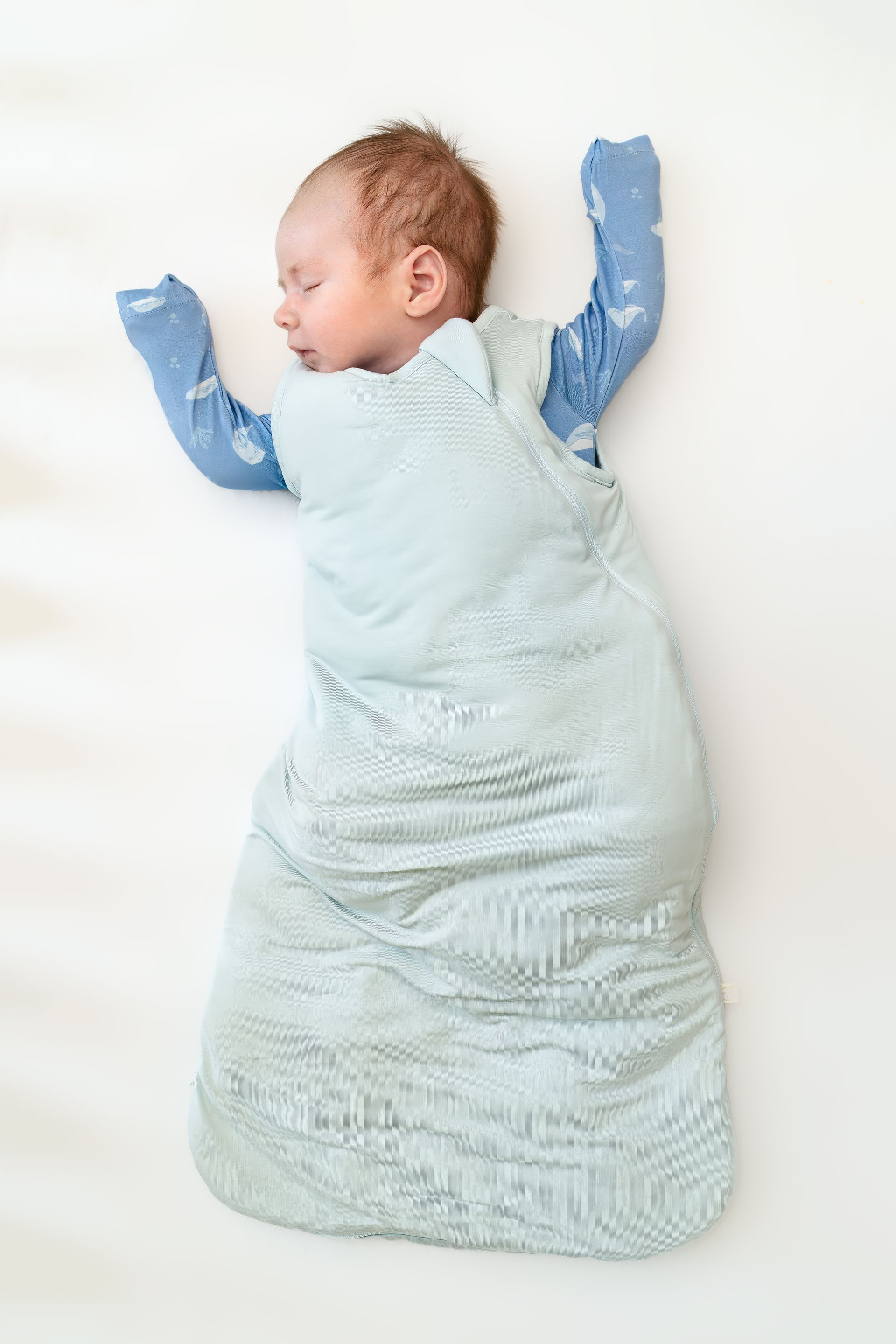Top Tips for Sleep Success with Multiples
lbenjell • April 13, 2022
Calling out all my twin + mamas: Its not a secret, having one newborn is hard, having two or more is more is: I don’t even know what to say… super hard? So for you, here are a few things to think about when it comes to your twins’ sleep.
Many multiples are born prematurely. And for sleep, that means that they will be reaching their sleep milestones according to their expected due date, not their actual delivery date. This means that when figuring out wake windows, sleep needs and schedule, we base it on their adjusted age, or the age from their expected due date, rather than their age based on their birthday.
THE SPACE
As is recommended for singletons, newborns should sleep by themselves in their own sleep space but in their parents room for the first six months at least. It is safest if each sleeps in their own crib. Many choose to have their babies in their room for at least the first few months for ease of access during night feeds. This is also a safe sleep measure so I encourage you to keep them in your room until you are ready to move them out. Once out of your room, whether you choose to have them sleep together in their own room or separately will be your decision, depending on your situation and how much space you have to work with. If room sharing, I would make sure that there is a distance between the cribs so that they can’t reach each others’ cribs.
Which leads me to my next point. You may hesitate to have them room share because they may wake each other up. And that they WILL. They will cry and they will disturb each other at first but the more that happens, the faster they will get used to it. I live in a helicopter flight path. When we first moved in, I was often woken up by a helicopter flying over us and then would have to put myself back to sleep. Now, I can barely hear it when awake, let alone when asleep. Same goes for children who sleep in the same room with their siblings, whether that be twins or different aged siblings: They will get accustomed to each others’ noises and won’t even notice them after a while.
THE SCHEDULE
Keep them on the same schedule. This goes for both sleeping and feeding. Having them sleep and wake up at the same time will save you the insane exercise of counting wake windows separately for each baby.
Having said that, a 15-30 minute difference between their wake up and sleep time is Ok. You don’t have a million hands so it is impossible to do routines, feeds and all exactly at the same time. Start with one twin and follow with the other. It is quite alright if one is running slightly behind the other.
If you are wondering which twin to start with, I’ve got you! You may have noticed that one of your babes is more sensitive than the other, gets overtired before the other, and the slightest change in their routine really does a number on his or her nights. This is your sensitive sleeper. Start with them and work around their needs when determining schedules and routines. Your less sensitive sleeper will adjust.
THE ROUTINE
If you do not have help during the bedtime routine, invest in a bouncer or similar item where you can safely lay one of the babies while you feed, bathe, change or put the other baby to bed. This will save you the worry (and time) you will spend checking to make sure that your other baby has not moved around and is in fact, still safe.
Bath does not have to be part of the bedtime routine. There, I said it! Baths are a great start to the bedtime routine and even help our bodies prepare nicely for sleep but if its going to be stressful and time consuming, then no need. There are plenty of ways you can prepare your babies for bed without having to do a bath. I say that to my singleton families all the time but in the case of twins, it is an even more important reminder.
What worked for you? Help a new twin mama out...

Choosing a car seat is one of the most important decisions you’ll make as a parent. It’s not just about convenience — it’s about giving your child the best protection on every journey . In the UAE, where we drive long distances, face busy roads, and deal with extreme heat, the right car seat matters more than ever. But with so many options, how do you know which one to choose? Here are our top 4 tips to make car seat shopping easier — and safer. 1. PRIORITIZE SEATS THAT UNDERGO THE TOUGHEST CRASH TESTING Not all car seats are created equal. Many parents think if a seat is “legal,” it must be safe — but that’s not always true. ECE R44 : The most basic standard, now phased out in Europe. ECE R129 (i-Size) : Stricter testing with better head, neck, and side-impact protection. The Swedish Plus Test : The toughest crash test in the world — and the gold standard. What makes the Swedish Plus Test so important? It’s the only test that measures neck forces on a child’s body in a crash. Seats that pass prove they can keep neck loads below dangerous limits — a key factor in preventing serious injury. Many car seats fail completely under this extreme test, which shows just how high the bar is. 👉 If a car seat has passed the Swedish Plus Test , you can be confident it offers the highest level of safety for your child. 💡 Remember: Legal does not always mean safe . Go beyond the minimum. 2. CONSIDER YOUR CHILD'S HEIGHT, WEIGHT, AND AGE — EVEN THE SMALLEST ONES Every child grows differently, and size matters when it comes to safety. Preemies and smaller babies : Standard carriers often don’t provide the right fit. They need extra support for the head, neck, and body, plus proper harness positioning. Twins or multiples : Planning seating for two (or more) at once requires careful choice so every child gets the safest setup. As children grow, their height and weight percentiles determine how long a seat will last. We recommend car seats with at least a 25kg weight limit and 125cm height limit , which allow for extended rear-facing travel . Why rear-facing ? Research shows it is up to 5 times safer than forward-facing for children up to 6–7 years old. Better crash force distribution across the strongest part of the body. Superior head and neck protection , preventing the whip-forward motion that can cause spinal injury. Cocoon-like shell protection against front and side impacts. 💡 Bonus for UAE parents: The BeSafe Go Beyond with Preemie Inlay was designed with neonatal nurses to support even the tiniest babies. It features a removable wedge for better harness fit and breathable mesh fabric — keeping your baby safe and cool in our hot weather. 3. MATCH THE CAR SEAT TO YOUR CAR AND LIFESTYLE Your car seat needs to fit not just your car — but your daily routine . Multiple cars? Choose a seat that’s easy to install/uninstall. Growing family? Invest in a seat with a long lifespan that can be passed down. Seat placement? Consider if it will go behind the passenger, in the middle, or side by side with another child seat. Bigger families? Narrow but safe seats can fit 3-across or work well in 7-seaters, without compromising protection. Example from our family setup: Mummy’s car : BeSafe Flex Fix 2 for Sofia (8y) + BeSafe Stretch for Leo (5y). Daddy’s car: Axkid One3 for Leo + BeSafe Flex Fix 2 for Sofia. The Axkid One3 was chosen because Daddy often removes the seat, and installation takes under 30 seconds . 👉 Key takeaway: The “best seat” isn’t the one your friend uses — it’s the one that fits your child, your car, and your lifestyle . 4. DON'T COMPROMISE — BUY FROM A CHILD CAR SEAT SPECIALIST Buying from a specialized retailer ensures peace of mind: They recommend a seat that fits your child, car, and routine . They install it correctly and show you how. If the seat doesn’t fit, they won’t install it — and they’ll help you find one that does. They’ll reinstall it whenever you need , for example when changing cars, at no extra cost. At Safety On Board , we offer 1-1 car seat consultation and hands-on support to make sure your child rides safely every time. FINAL THOUGHTS A car seat isn’t just another baby item — it’s life-saving equipment. Whether you’re bringing home a preemie, juggling twins, or moving a big kid into a booster, the right seat + the right suppor t makes all the difference. If you’re unsure where to start, contact us and book a consultation with us. We’ll help you find the perfect fit for your child, your car, and your family. Because every child in the UAE deserves the safest ride 💛 Sophie Huang is the founder of Safety on Board , the UAE’s first child car seat specialist. She is also a mom of 2 and an internationally certified car seat expert . With a passion for keeping children as safe as possbile on UAE road, she guides parents in choosing and installing the safest car seats. Sophie believes safety can be simple, stress-free, and empowering for every parent.

There’s something magical about a beach holiday — the sound of waves, salty air, and the promise of slow days in the sun. But let’s be honest: traveling to the beach with a baby isn’t exactly a vacation unless sleep is part of the equation. Whether you're heading to a resort, renting a seaside villa, or visiting family by the coast, here’s how to set your baby up for restful sleep — so everyone gets to enjoy that ocean breeze. Step 1: Know That Sleep Needs Don’t Take a Holiday Babies are creatures of habit. Their little bodies thrive on rhythm and predictability — even on vacation. But that doesn’t mean you can’t have fun or go with the flow! It just means that your baby’s sleep needs are still there, and the better prepared you are, the easier it will be to keep things (mostly) on track. Step 2: Your Beach Baby Sleep Packing List Here’s your ultimate baby sleep packing list for a beach trip, broken down by category: Sleep Environment Essentials : Portable travel crib or bassinet – Choose one your baby is already familiar with if possible. Fitted sheets – Bring 2-3 just in case of sand, spills or spit-up. Also bring a gently used one to remind baby of home as he/she adjusts to the new sleep environment. Portable blackout blinds – Beach homes and rentals often have light, sheer curtains. White noise machine or app – Helps block out unfamiliar sounds like waves (yes, they can be loud!) or street noise. Baby monitor (if you’ll be in a larger space or stepping outside during naps). For more on the ideal sleep environment, have a read here . Comfort + Routine : Lovey or comfort object (if age-appropriate and safe for sleep). Sleep sack – Choose a breathable, summer-weight one. Favorite bedtime book – Familiarity brings comfort. Pacifiers – Always bring extras! Nightlight – A soft, warm one if needed for feeds or changes during the night. Weather + Climate Considerations : Lightweight, breathable pajamas – Think cotton or bamboo Fan – If your rental lacks good airflow or AC Bonus Tip: Have a “Nap-on-the-Go” Kit **For beach days that cut into nap time: Clip-on stroller fan Stroller or baby carrier your baby can sleep in Portable white noise machine Extra sun hats + baby-safe sunscreen (for after 6 months old) Step 3: Keep the Routine (Even on the Coast) Try to mirror your bedtime routine as closely as you can. If you usually do bath → PJs → book → feed → sleep, stick with it — even if it’s a quick version. Babies love the predictability, and it helps signal that it’s time to wind down, even in a new environment. Also, aim for naps in a darkened room when possible, especially after a stimulating beach outing. And if one nap has to happen in the stroller under a palm tree? That’s totally okay. Just go back to the routine as soon as you can. Getting There: Travel Day Tips Time your departure around naps if possible Use familiar sleep items (like the sleep sack or pacifier) during flights or drives Offer extra feeds — travel is dehydrating, especially in hot weather Keep expectations flexible – sleep may not be perfect, and that’s fine Beach trips with a baby can be full of joyful memories and restful nights — as long as you plan for sleep. With the right gear and mindset, your little one can stay well-rested and content, giving you more time to soak up the sun (or at least drink your coffee while it’s still warm!). And remember: sleep doesn’t have to fall apart just because you’re away from home. If you ever feel stuck or unsure about how to adjust things before, during, or after a trip, I’m here to help you build a personalized plan that fits your family’s travel style. Book your discovery call here .

October is SIDS Awareness Month, dedicated to raising awareness about Sudden Infant Death Syndrome. It’s a time to educate parents and caregivers on safe sleep practices that can reduce the risk and help protect our little ones.. At Hushabye, safety is at the heart of our brand. Our focus is on providing parents with safe and high-quality baby sleepwear, such as sleep bags, that offer a safer alternative to traditional blankets. What is a baby sleep bag? A baby sleep bag, also known as a wearable blanket or sleep sack, is a specially designed garment for infants and young children to wear during sleep. The primary purpose of a sleep bag is to keep the baby warm and comfortable, but it also serves as a safe and convenient alternative to traditional blankets and quilts in a crib or cot.


